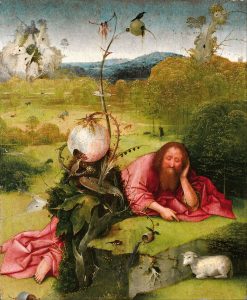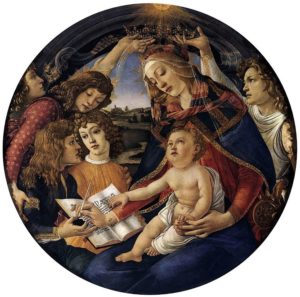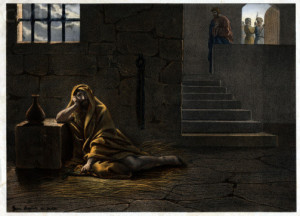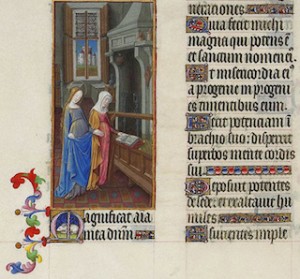Illuminations on the Lectionary readings for Dec. 11, 2022 (Advent 3A)
First Reading: Isaiah 35:1-10
The third Sunday of Advent is traditionally called Gaudete (“Rejoice”) Sunday. We light the one pink candle in the Advent wreath. We pause in the quiet anticipation of Advent as we feel joy at the coming celebration of Jesus’s birth. Our Lectionary readings for Advent subtly shift in tone from quiet expectation toward anticipatory joy, too.

Saint John the Baptist in the Wilderness (c.1589), oil painting on panel by Hieronymus Bosch (c.1450-1516). Museo Lázaro Galdiano, Madrid. (Click image to enlarge.)
The readings for the Third Sunday of Advent hold up themes of joy and service, beginning in the first reading with Isaiah’s prophetic voice of hope for the people’s return home to Jerusalem from exile in Babylon. “The desert shall rejoice and blossom … rejoice with joy and singing,” the prophet foretells. And this promise of joy is directed specifically to the oppressed, the weak, those who suffer pain … all those who Jesus would later call us to serve.
Psalm: Psalm 146:4-9
Psalm 146, titled “Praise the Lord, O My Soul,” is a resounding hymn of praise for our Creator, the God eternal who made heaven, earth, the seas and all that is in them. Its poetic words of promise shout that the oppressed will receive justice from God. God will feed the hungry, set prisoners free, care for strangers, orphans and widows, and give sight to the blind. All this foreshadows the words that Mary will sing in the Magnificat (which is also available as an alternate Psalm on this Sunday). We hear them echo again whenever Jesus describes God’s Kingdom on earth.
Alternate Psalm: Canticle 15 (Luke 1:46-55)
As an alternative to a Psalm this Sunday we may sing Luke’s Song of Mary. If you think of the mother of Jesus as a sweet, submissive figure, take a closer look at the words this teen-aged Palestinian woman sings when the angel tells her she would be the mother of God: “ … he has scattered the proud … brought down the powerful … lifted up the lowly … filled the hungry with good things … sent the rich away empty.” This understanding of the divine links Torah and the Gospels. It describes the action that Jesus explicitly asks of those who follow his way.
Second Reading: James 5:7-10
Sunday’s Lectionary selection for the second reading breaks in a bit awkwardly in the middle of a thought: “Be patient, therefore” prompts us to wonder what came before. If we turn back a few verses to find context, we discover James – like Mary in the Canticle – excoriating the rich, or more specifically, the selfish rich. “you rich people, weep and wail for the miseries that are coming to you. … You have laid up treasure for the last days. Listen! The wages of the laborers who mowed your fields, which you kept back by fraud, cry out, and the cries of the harvesters have reached the ears of the Lord of hosts.” Then we hear James’s command: Love each other, and be generous with one another, lest we be judged.
Gospel: Matthew 3:1-12
The Gospel according to Matthew consistently emphasizes that Jesus is Messiah, the lord and savior whom the prophets foretold. Here Matthew tells of a long-distance conversation through messengers between Jesus and John the Baptist in prison. Matthew invokes a passage from Isaiah’s gospel as a way to declare that John is God’s messenger who makes straight the way for Jesus, the Messiah. Then, as John’s messengers leave, Jesus tells the crowd of people what to expect, echoing the ideas in his mother’s song: “… the blind receive their sight, the lame walk, the lepers are cleansed, the deaf hear, the dead are raised, and the poor have good news brought to them.”



